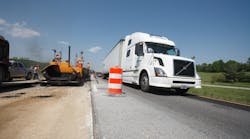Generating a “sustainable” level of funding to maintain and expand the U.S. highway system is going to be the biggest challenge facing the transportation industry as a whole, according to John Horsley, the outgoing executive director of the American Association of State Highway and Transportation Officials (AASHTO).
In an interview with Fleet Owner, Horsley stressed that “the time has come to face the music” in terms of recognizing that the monies currently generated by fuel taxes – the primary source of funding for highway infrastructure projects – is inadequate to meet the system’s current and future needs.
“The national highway system is over 50 years old now and many roads and bridges are just worm out,” he said. “How we generate the funds necessary not just to preserve the system but expand it to meet growing demand is going to be the single biggest challenge faced by transportation in the coming years.”
He noted that the Highway Trust Fund (HTF) is currently spending $15 billion more per year compared to the revenues it receives and – at that rate – could become insolvent by October next year, which would cut annual federal highway investment from $41 billion to $6 billion and annual transit investment from $11 billion to $3 billion.
Horsley – who officially retired last week after service as AASHTO’s executive director for 14 years – recommended changing highway fund taxation methods as one possible way of solving the HTF’s revenue shortfall.
For example, he proposed converting the current "cents per gallon" federal excise tax on fuels to a sales tax on fuels during a speech at the Transportation Research Board (TRB) annual meeting last month in Washington, D.C. – a move he said would support spending on highways and transit over the next six years at $350 billion, at a cost to the taxpayer of less than $1 per week, per vehicle.
“A sales tax generates more revenue and keeps up with changes in fuel prices,” he explained to Fleet Owner. “Thus as fuel prices rise, we’d generate more funds. By contrast, a cents-per-gallon tax generates the same amount of revenue regardless of changes in fuel prices. A sales tax simply brings in more money.”
Another piece of the funding puzzle, however, centers on generating public interest – and eventually support – in the need to overhaul transportation funding mechanisms.
“People treat transportation the way they treat the utility services connected to their homes in many ways,” Horsley explained.
“If the toilets flush, the water flows, and the lights turn on, then everything is fine – people don’t think about them any further; they take them for granted,” he said. “But the fact is, everything wears out eventually and needs replacing – and we need a funding concept that will get public support so we can conduct that replacement work where transportation is concerned.”



